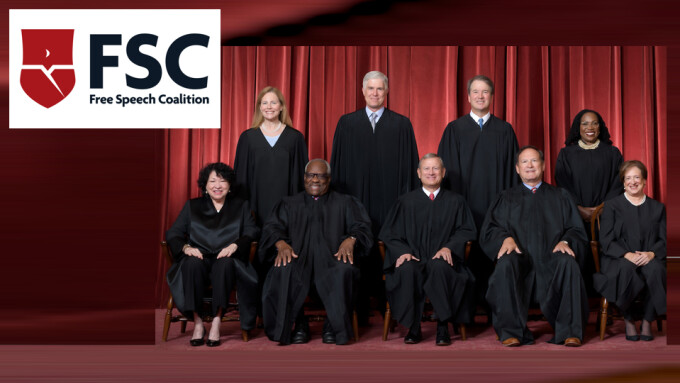WASHINGTON — The Free Speech Coalition (FSC) urged the U.S. Supreme Court through a brief filed Monday to strike down Texas’ age verification law as unconstitutional.
The FSC statement regarding the filing follows:
The American Civil Liberties Union, ACLU of Texas, and Quinn Emanuel today filed a brief in the Supreme Court on behalf of the Free Speech Coalition (FSC) and other plaintiffs in Free Speech Coalition v. Paxton, arguing that the age verification provision in Texas’s HB 1181 violates the First Amendment by improperly burdening adults’ right to access sexual content online.
HB 1181 requires any website that publishes content one-third or more of which is “harmful to minors” — a broad category that includes virtually any explicit content — to force their visitors to provide digital IDs or other proof of age before they can access the published material, regardless of what is on the other two-thirds of the site.
“Adults in America have a First Amendment right to read about sexual health, see R-rated movies, watch porn, and otherwise access information about sex if they want to. They should be allowed to exercise that right as they see fit, without having to worry about exposing their personal identifying information in the process,” said Vera Eidelman, staff attorney with the ACLU Speech, Privacy and Technology Project. “Rather than requiring adults to give up their privacy in order to watch and read content the government doesn’t like, legislators should focus on shaping a safer internet through things like voluntary content filters, which give control to people, not the government.”
Texas claims this provision is about protecting minors from accessing sexual content deemed harmful to them, not regulating disfavored content, but it does not merely restrict minors’ access. It also restricts adults’ access, requiring them to identify themselves online and burdening their ability to exercise their First Amendment rights to see sexual content or any other material on a regulated site. As the brief explains, requiring individuals to verify their ages before accessing this protected speech robs people of anonymity, and threatens to bar individuals—for example, those who lack government identification or whose age is misidentified by the relevant technology—from accessing certain websites altogether. Such a restriction is not necessary given the availability of other options, like content filtering, that could accomplish the government’s goal while imposing less of a burden on speech.
“While Texas’ law may sound reasonable on its face, in practice, it is extraordinarily burdensome and invasive, effectively deterring adults from accessing legal content,” said Alison Boden, executive director of the Free Speech Coalition. “To make matters worse, this law – and ones like it – fail at their stated goal of protecting children online, despite forcing adult content creators and consumers to operate under the threat of surveillance and censorship.”
At the same time, the law will not accomplish its stated goal. Because the law only applies if one-third of a site’s content is explicit, social media sites that offer much of the same content, but as a smaller proportion of their total offerings, avoid the law’s requirement. And search engines are exempted entirely, meaning minors can access exactly the same sexual content online via such sites. Moreover, the law’s requirement that regulated sites issue unscientific health warnings about the negative effects of exposure to pornography illustrate the state’s distaste for the regulated speakers.
Before the case reached the Supreme Court, a district court briefly blocked the law from being enforced, concluding that the law’s age verification provision would unconstitutionally chill the speech of adults. However, a divided Fifth Circuit panel vacated that injunction, reasoning that the age verification provisions’ burden on adults’ First Amendment rights merely has to have some rational basis–not face strict scrutiny–because the aim is to protect children. Unless the Supreme Court issues a reversal, this decision will overturn decades of precedent protecting the free speech rights of adults.
In prior cases brought by the ACLU, the Supreme Court has repeatedly held that requiring users to verify their age to access protected content is unconstitutional where there are less restrictive alternatives available, like filtering software. In Reno v. ACLU, the Supreme Court unanimously ruled that anti-indecency provisions of the 1996 Communications Decency Act, also meant to protect children, violated the First Amendment's guarantee of freedom of speech in part because of the burden it imposed on adults. In Ashcroft v. ACLU, the Court held that a law almost identical to the Texas law had to satisfy strict scrutiny because it restricted adults’ access to protected sexual speech. Where a less-restrictive alternative exists—for example, the voluntary installation of filtering software on minors’ devices—the government cannot impose age verification on adults in the name of protecting children.
Free Speech Coalition v. Paxton is one of several cases in which the ACLU has urged courts to reject age verification schemes that would burden the free speech rights of internet users as part of the organization’s long tradition of defending online free expression.
The ACLU’s brief in Free Speech Coalition v. Paxton is a part of the ACLU’s Joan and Irwin Jacobs Supreme Court Docket.







